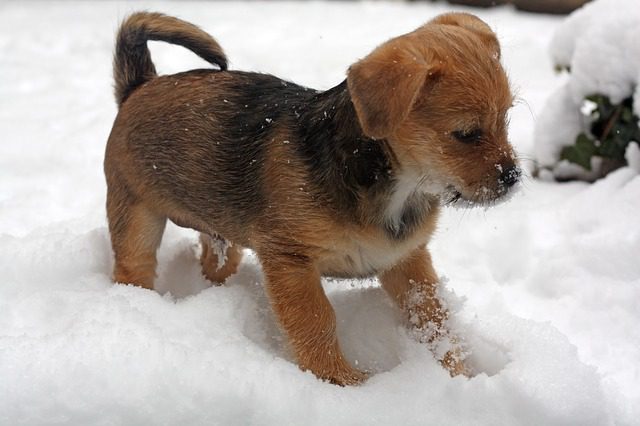
Get out and enjoy the ambiance that only a snowy winter can provide!
Winter can be a challenging season for dog owners, and in Michigan it can feel like winter is about six months long. So how do we help our companions make it through, withstanding the cold while getting out to eliminate and exercise and staying safe in the process? There are lots of things to consider—before, during and after— to get the most enjoyment out of those winter walks.
Cold conditioning
Your dog’s level of cold-weather conditioning is very important, as a pup that’s used to lazing around by the fire or sleeping in a warm bed all day will likely not be ready for an hour-long tromp through the snow the day after a blizzard.
For humans, 40 degrees may seem extremely cold in October but downright warm in January, because we’ve had months to get used to even colder temperatures. The same is true for dogs, so get them used to the cold and snow over time. You may want to start with short walks on plowed paths or walkways, and build up from there in duration and amount of snow. Your dog will likely make it clear what he’s comfortable with.

Little puppers will get cold more easily than adult dogs.
Consider your dog’s health
Do you have a puppy or geriatric dog? Is your dog sick, or does he suffer from a health condition like heart disease, diabetes or arthritis? Dogs that are very young or old, or who are in less than optimal health, tend to have a harder time regulating their body heat and so will get colder more easily; elderly dogs and those suffering from arthritis tend to get get stiffer and have more difficulty moving around when it’s cold or there’s snow on the ground.
Winter walks in the city may provide extra dangers
If you and your dog do most of your walking in the city where it’s likely there are salt and chemical ice treatments on the sidewalks and roads, be sure to wipe off his paws and belly with a cloth and warm water when you get home. This will help minimize the dryness and irritation that contact with the salt can cause. Plus, if you don’t clean those paws he’ll probably lick them clean himself, thereby ingesting the salt and chemicals picked up while out and about, and that can make him very sick.
Ingestion of chemical ice melt or rock salt can cause symptoms like vomiting, diarrhea and drooling, and you should call your veterinarian if your dog is exhibiting these.
When your winter walks lead you through lots of snow and ice, your dog may suddenly start to favor a foot. Check that paw for cuts or abrasions and for ice buildup between his toes, which can be painful to walk on. (You can help prevent the formation of ice balls by keeping the hair clipped on the bottom of your dog’s foot or between his toes.)

When it’s too cold to go out, there’s nothing wrong with relaxing indoors in your favorite sweater.
Size matters
The dogs that will do the best outside in the cold are those with longer and denser hair, and especially larger dogs generally. Fur insulates, and larger dogs have more mass compared to their surface area, which helps them maintain their body heat better than their smaller brethren. It is true that more body fat provides more insulation, but don’t even think about fattening your dog up for winter! The downsides of being overweight are dramatic.
Make sure your dog has ready access to clean, unfrozen water. Don’t let him drink from puddles, which may be contaminated by the various ice melts and/or antifreeze from cars, and clean up any of your own antifreeze spills immediately. The sweet taste of the ethylene glycol in antifreeze is attractive to animals, including dogs, but it is very poisonous. As above, if you think your dog has ingested antifreeze, contact your veterinarian immediately.
When it gets too cold
While out on a winter walk, be it a country field, city sidewalk or just playing in the yard, keep an eye on your pooch and his behavior. You know him best. Is he acting normal? You can likely keep walking or playing. When he starts acting differently— holding up one or more paws, shivering, seeking shelter or trying to burrow into the snow— it’s time to go in!
Finally, remember that sometimes it’s just too cold to be outside. It’s not worth the risk of frostbite or hypothermia. Maybe you can duck out so your pooch can potty, but you can find ways to expend his energy indoors.
Has your dog had a wellness visit lately? One of our veterinarians can help determine if there are any medical problems that may hinder your dog from fully enjoying the outdoors this winter. For your convenience, Ann Arbor Animal Hospital is open to serve you seven days a week, with Urgent Care during our opening hours.
Recent Posts
About Us
Ann Arbor Animal Hospital is a locally-owned animal hospital operating for over 90 years in Ann Arbor, MI.
